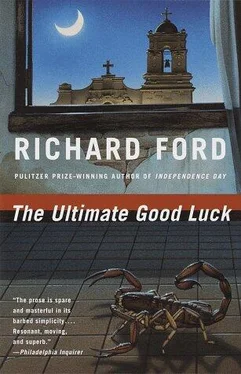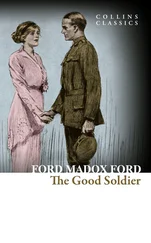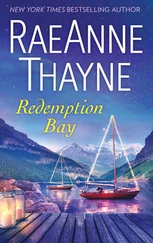“He doesn’t care about that,” she said, her face motionless in the dash light. “It’s not your business anyway. Who I fuck is my business.”
“It was supposed to make me trust him.”
“How nice,” she said. She seemed amused, as if Bernhardt had been a child she was tired of. “Are you happy you trusted him?”
“You said it.” He watched her face in the dark. He wanted to see a response. “It’s my business. It didn’t work out, that’s all.”
“Apparently not.” She turned down Bustamante Street above the Centro, where there were no streetlights. “But it leaves you in a bad position now, I’m afraid,” she said.
There were no soldiers on the street, and the pottery alleys in the next block were shut, though far down beyond the market he could see in the sheen of night rain the glare of the truck garages still working.
“I want to know who Deats is,” Quinn said. They were not very far from the Hotel Monte Albán. He thought he could make it back all right now and he felt safer, which he knew was also silly.
“He’s a man who works for my husband,” Susan Zago said, carefully watching the adobe façades pass by the car window. She was looking for something that required her concentration. “In the States. You know? A connection?” She looked at him as though she’d figured something out. “You need time, don’t you Mr. Quinn? But you don’t have it. Too many facts piling up.”
“I guess I’ll have to brave it,” he said.
She stopped the Renault outside a white building without windows, but with a curved arch-entry to an invisible inside. It became quiet a moment. “I always try to remember everything that ever happened to me, you know?” She smiled over at him appealingly, her face pale and calm. Her perfume smelled sweet. “So I need time. I suppose I think everybody else is the same way.”
“I forget as much as I can,” Quinn said.
“A tough guy,” she said, and her look became strange again, as if she believed him and pitied him at the same time.
“How did you get into this?” he said.
“In what?” she said.
“These people.”
“It’s fun,” she said, and looked out the window behind him into the rain as if for a signal. “Don Luis is an old man. I’m interested in young men. Our interests coincide.” She opened her door. “There’s nothing else amusing to do here.”
The arch-entry protected them a moment from the rain, then opened to an atrium where there was a low concrete sculpture and a reflecting pool. The building was two-tiered with a loggia and a stone staircase at the far end that rose to the gallery level. The rain was intense inside the court, and it was hard to see what the sculpture was imitating.
Susan Zago hurried up the far stairs ahead of him and Quinn had a strong feeling suddenly of being followed. He looked back in the open court, but no one was there.
At the top of the stairs a man leaned forward out of the dark with a short, blunt-nosed weapon, and Susan Zago immediately stepped aside. The man was not a man really, but the boy who had killed Bernhardt. He was wearing thick black-rimmed glasses with wet lenses, and put the barrel of the gun squarely in the middle of Quinn’s stomach and reached forward to search. “Don’t cause trouble,” Susan Zago said quietly from the side. “This is necessary.”
He wanted to concentrate on the boy. He had almost shot him the night before and now the same boy was keeping him in the rain while he patted under both arms and down his trouser seams, the gun barrel jerking against his stomach. The boy smelled like disinfectant and didn’t search like Zago’s man. He did it the way he’d seen it in movies, and he missed the pistol in the small of his back. The boy’s hair was wet and parted in the middle and slicked back, making him look very young. When he finished the boy dropped his eyes. It felt odd, Quinn thought, always to be intimate with strangers, never with people you cared about. Kids with guns. Ladrinos. It had to be another phase of the modern predicament.
He wanted to know how many people were here now. It was a measure of normal efficiency to know who you’re going to see coming back out. He looked around the dark gallery, but there was no one to see behind the other balusters.
Midgallery there was a door to the right. Susan Zago stopped in front and turned. “You get to see where I paint,” she said. Her skin was light colored and her hair shone in the dark.
“Who’s that boy?” he said. He touched the pistol grip, found he could reach it with his entire hand. He felt himself getting cold along his ribs.
“Just a boy,” she said. “Do you know him?”
“ ’Fraid not,” he said.
“Just step inside,” she said.
The air inside made him think there were high ceilings, though he couldn’t see walls. The air felt cool and large, and there was a thin odor like kerosene that didn’t seem to come from any one direction. Susan Zago closed the door and shut out the rain noise, and immediately there was a sound to the left of feet moving. He couldn’t see distinctly. Water ran out of his hair, and he pulled the gun to the front of his belt against his stomach.
There was the sound of glass scraped over metal, and a match flared low to the floor. He could see two knees and two hands raising the chimney of a metal lantern. The odor of kerosene grew stronger while the man fingered the glass, holding the match until the wick flamed and burnt off freshly and began a glow. The man lowered the chimney with his finger tips, adjusted the jet so the light grew into the dark, then picked up the lantern and held it out and walked forward toward where Quinn stood with Susan Zago.
“This is Señor Muñoz,” Susan Zago said formally.
He watched the man shape up behind the lantern. He was a tall handsome boy in his twenties with a smooth brown face and fine features that looked more intelligent than the boy’s outside. He was wearing a blue cotton work shirt and white pants, and his hair was neat. His eyes moved confidently to Susan Zago when he heard his name spoken. He had a big automatic pistol stuck in the front of his trousers, the grip turned toward the hand that carried the lantern. When he came closer he raised the lantern so that Quinn could feel the heat in his eyeballs, then drew it back as if he had satisfied himself. “I am sorry to meet you this way,” the boy said politely, and his face became serious. “I would like to meet you in a nice restaurant if I could. But.” He smiled in an embarrassed way.
Quinn tried to think if this was a boy he’d seen her with in the Portal. “This’ll do,” Quinn said. “Let’s just get on with it.”
Muñoz’s eyes darted at the ceiling, then back as if he had avoided saying something. Quinn could see high on the walls, but not low. They were white with no windows, though most of the studio felt behind him. The lantern hissed and Muñoz took a firm breath. “Your brother is in the cárcel?” he said softly.
“Right,” Quinn said.
Muñoz’s eyes trained on him thoughtfully. “It is a terrible place,” he said.
“In a world of bad places,” Quinn said.
Muñoz thought a moment, then smiled appreciatively. “Is true. But I can bring him out for you. It is not difficult.”
“That’s odd,” Quinn said, “because it’s been really difficult for me so far. You understand?”
“My brother is the guardia,” Muñoz said with authority. Muñoz was a student. He had that bullshit unassailable certainty about him. “So it is possible to let your brother out,” he said, “and to take him where it is safe.” Muñoz’s eyes held steady. You couldn’t know what that steadiness meant, except he was eager.
“Where’s safe?” Quinn said.
Читать дальше







![Theresa Cheung - The Dream Dictionary from A to Z [Revised edition] - The Ultimate A–Z to Interpret the Secrets of Your Dreams](/books/692092/theresa-cheung-the-dream-dictionary-from-a-to-z-r-thumb.webp)




